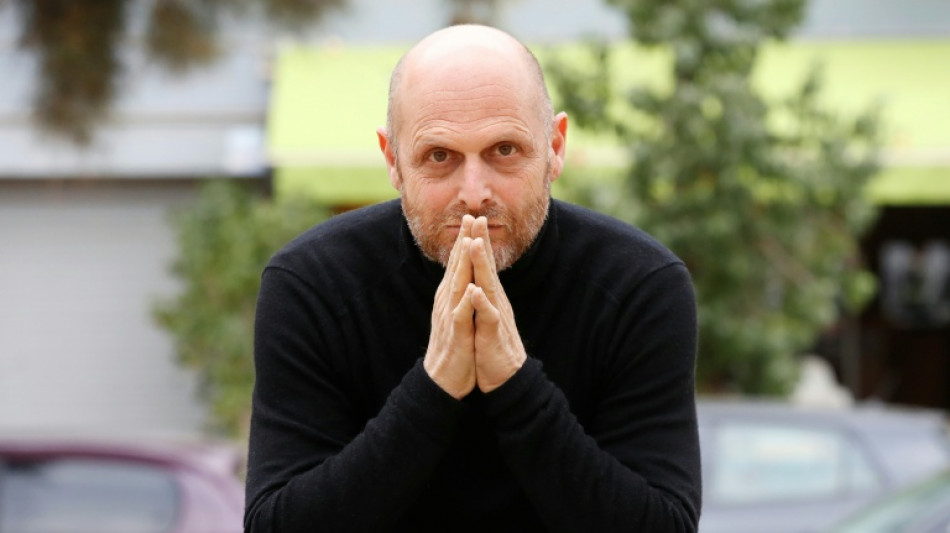
| RBGPF | -0.37% | 80.75 | $ | |
| RELX | -1.71% | 40.42 | $ | |
| AZN | -0.63% | 91.93 | $ | |
| RYCEF | 0.13% | 15.51 | $ | |
| BP | -0.06% | 34.73 | $ | |
| GSK | -0.53% | 49.04 | $ | |
| SCS | 0.12% | 16.14 | $ | |
| BTI | 0.12% | 56.62 | $ | |
| NGG | -0.54% | 77.35 | $ | |
| RIO | -0.61% | 80.03 | $ | |
| CMSC | -0.15% | 22.65 | $ | |
| VOD | -0.15% | 13.21 | $ | |
| BCC | -0.26% | 73.6 | $ | |
| CMSD | 0.09% | 23.15 | $ | |
| JRI | 0.22% | 13.61 | $ | |
| BCE | 1.05% | 23.82 | $ |

TV writer Hagai Levi: boycott risks hitting Israel's critical voices
Acclaimed Tel Aviv-based TV screenwriter Hagai Levi says many artists like him want to leave Israel because of the Gaza war, fearing the consequences of a gathering cultural boycott of their country.
Levi, writer of a string of TV hits including "Scenes from a Marriage", "The Affair" and "In Treatment", is an outspoken critic of Israel's siege of Gaza and understands international anger over the issue.
But he worries that calls for a boycott of Israel will end up stifling domestic voices that are critical of Prime Minister Benjamin Netanyahu, the politician has singled Levi out for criticism in the past.
"Everyone around me is talking about the possibility of leaving" Israel, the 62-year-old told AFP this month at the Venice Film Festival, where he presented his latest series "Etty".
"It's just so hard to leave... people are asking 'how will I find work? Will I find friends? Will I find family?'" he said, adding that he expected "many" to emigrate in the coming years.
The August 27-September 6 Venice festival saw a collective of independent Italian filmmakers call on organisers to cancel invitations for actors Gerard Butler and Gal Gadot over their past support for the Israeli military.
Since then, thousands of film figures, including Emma Stone, Joaquin Phoenix and Olivia Colman, have signed a pledge to cut ties with any Israeli institutions supported by the government.
Levi keeps a home close to his children, mother and sisters in Tel Aviv but spends most of his time in Europe or Hollywood, where he has helped open doors for other Israeli productions.
Regarding pro-government entertainment figures, he said "you cannot be part of what's going on, knowingly and supportively, and think that there's not going to be consequences. That makes no sense".
"But there should be a distinction... I would say 90 percent of people in the artistic community in Israel, whether it's cinema or plastic arts or music, they are fighting, they're in the streets, and they are suffering because there are no budgets, less freedom of speech.
"They're struggling, and boycotting them is actually weakening them."
Organisers of the boycott movement draw inspiration from the isolation of apartheid South Africa in the 1960s, when many artists refused to perform in the country or maintain links to the white supremacist government.
- 'Dehumanisation' -
Levi's latest series, "Etty", tells the story of 27-year-old Etty Hillesum, a Jewish Dutch woman who wrote detailed diaries about daily life and her spiritual awakening in Nazi-occupied Amsterdam in the early 1940s.
He read "The Diaries of Etty Hillesum" and thought he had come across "something I could talk about for the rest of my life".
But he wanted to avoid producing another conventional Holocaust story about the Jewish experience.
"You cannot just do it the same. It's been done," he said. "You have to take some universal ideas and universal thoughts about it."
He cited Jonathan Glazer's Oscar-winning film "The Zone of Interest", about a Nazi family ignoring the horrors of Auschwitz, as an example of a contemporary re-telling of the Holocaust.
"Etty", starring Austrian actor Julia Windischbauer and created for French-German TV channel Arte, also explores the process of "dehumanising" others to justify violence against them -- something with relevance to the ongoing Gaza conflict.
"What I try to say is that when the value of life becomes so cheap and massive because you kill so many people, then even the value of life of your own citizens becomes nothing," Levi said.
"Etty" is shot against a backdrop of contemporary Amsterdam. Nazi soldiers wear 1940s uniforms, but everyone else wears modern clothes, while modern trams and cars zip around in front of recognisable street furniture from the current era.
"I wanted it to be modern, but not contemporary," Levi said, noting that he excluded mobile phones and computers.
The aim was to unsettle viewers, making them wonder what political repression and persecution might look like today.
"It should speak about every person or every population in distress or in danger," he said.
H.Davenport--NG



